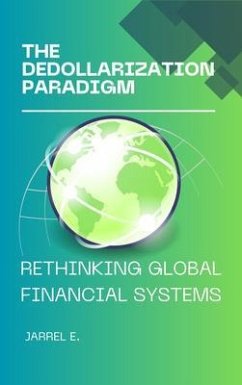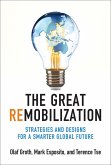The Dedollarisation Paradigm: Rethinking Global Financial Systems
In an age of profound economic transformation, the world is witnessing a fundamental shift away from the once unassailable dominance of the United States dollar (USD) in global finance. The pages of history are being rewritten as nations, economies, and financial institutions grapple with the challenges and opportunities of dedollarisation. "The Dedollarisation Paradigm: Rethinking Global Financial Systems" offers an insightful and comprehensive exploration of this paradigm shift.
In this groundbreaking book, we embark on a journey into the heart of the dedollarisation phenomenon. We delve deep into the complexities of a multipolar monetary system and examine its far-reaching implications for the global economy, trade, investment, and geopolitics. Through meticulous research, expert analysis, and real-world case studies, we unravel the intricacies of a world less dependent on the USD and the emergence of alternative reserve currencies.
"The Dedollarisation Paradigm" takes readers on a compelling exploration of the history of the US dollar's rise to global prominence and its impact on international finance. It dissects the Bretton Woods System and dollar hegemony, laying bare the intricate web of financial power that has characterized the post-World War II era.
But this book doesn't stop at history. It goes on to provide a forward-looking perspective, offering a roadmap for dedollarisation strategies and highlighting the benefits, challenges, and risks associated with this monumental shift. It explores the role of central banks in dedollarisation, the challenges of currency diversification, and the need for international cooperation in a multipolar world.
Through in-depth analysis and thoughtful commentary, "The Dedollarisation Paradigm" equips readers with a nuanced understanding of the global financial system's future. It offers a glimpse into the potential scenarios that may unfold and their implications for global stability, trade relations, and economic equilibrium.
Key Themes
- Historical Perspective: The USD's journey from its inception to global dominance.
- Bretton Woods System: How it shaped the dollar's hegemony.
- Dedollarisation Strategies: Roadmaps for nations seeking to reduce USD dependence.
- The Role of Central Banks: Their influence in the dedollarisation process.
- Currency Diversification: Reducing risk through a multipolar monetary landscape.
- Global Stability: Implications of dedollarisation on trade, finance, and geopolitics.
"The Dedollarisation Paradigm: Rethinking Global Financial Systems" is an essential read for policymakers, economists, financial experts, and anyone seeking to comprehend the transformative forces at play in the global financial arena. With a wealth of information and a forward-thinking approach, this book shines a light on the evolving world of finance and the profound implications of dedollarisation on a global scale.
In an age of profound economic transformation, the world is witnessing a fundamental shift away from the once unassailable dominance of the United States dollar (USD) in global finance. The pages of history are being rewritten as nations, economies, and financial institutions grapple with the challenges and opportunities of dedollarisation. "The Dedollarisation Paradigm: Rethinking Global Financial Systems" offers an insightful and comprehensive exploration of this paradigm shift.
In this groundbreaking book, we embark on a journey into the heart of the dedollarisation phenomenon. We delve deep into the complexities of a multipolar monetary system and examine its far-reaching implications for the global economy, trade, investment, and geopolitics. Through meticulous research, expert analysis, and real-world case studies, we unravel the intricacies of a world less dependent on the USD and the emergence of alternative reserve currencies.
"The Dedollarisation Paradigm" takes readers on a compelling exploration of the history of the US dollar's rise to global prominence and its impact on international finance. It dissects the Bretton Woods System and dollar hegemony, laying bare the intricate web of financial power that has characterized the post-World War II era.
But this book doesn't stop at history. It goes on to provide a forward-looking perspective, offering a roadmap for dedollarisation strategies and highlighting the benefits, challenges, and risks associated with this monumental shift. It explores the role of central banks in dedollarisation, the challenges of currency diversification, and the need for international cooperation in a multipolar world.
Through in-depth analysis and thoughtful commentary, "The Dedollarisation Paradigm" equips readers with a nuanced understanding of the global financial system's future. It offers a glimpse into the potential scenarios that may unfold and their implications for global stability, trade relations, and economic equilibrium.
Key Themes
- Historical Perspective: The USD's journey from its inception to global dominance.
- Bretton Woods System: How it shaped the dollar's hegemony.
- Dedollarisation Strategies: Roadmaps for nations seeking to reduce USD dependence.
- The Role of Central Banks: Their influence in the dedollarisation process.
- Currency Diversification: Reducing risk through a multipolar monetary landscape.
- Global Stability: Implications of dedollarisation on trade, finance, and geopolitics.
"The Dedollarisation Paradigm: Rethinking Global Financial Systems" is an essential read for policymakers, economists, financial experts, and anyone seeking to comprehend the transformative forces at play in the global financial arena. With a wealth of information and a forward-thinking approach, this book shines a light on the evolving world of finance and the profound implications of dedollarisation on a global scale.
Dieser Download kann aus rechtlichen Gründen nur mit Rechnungsadresse in A, D ausgeliefert werden.









